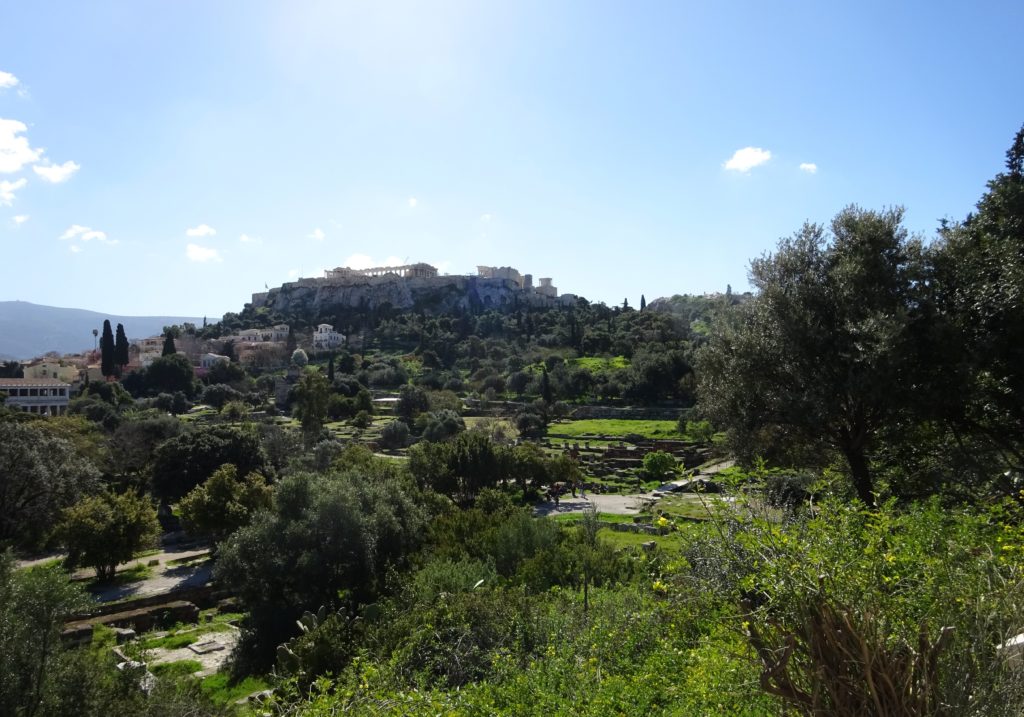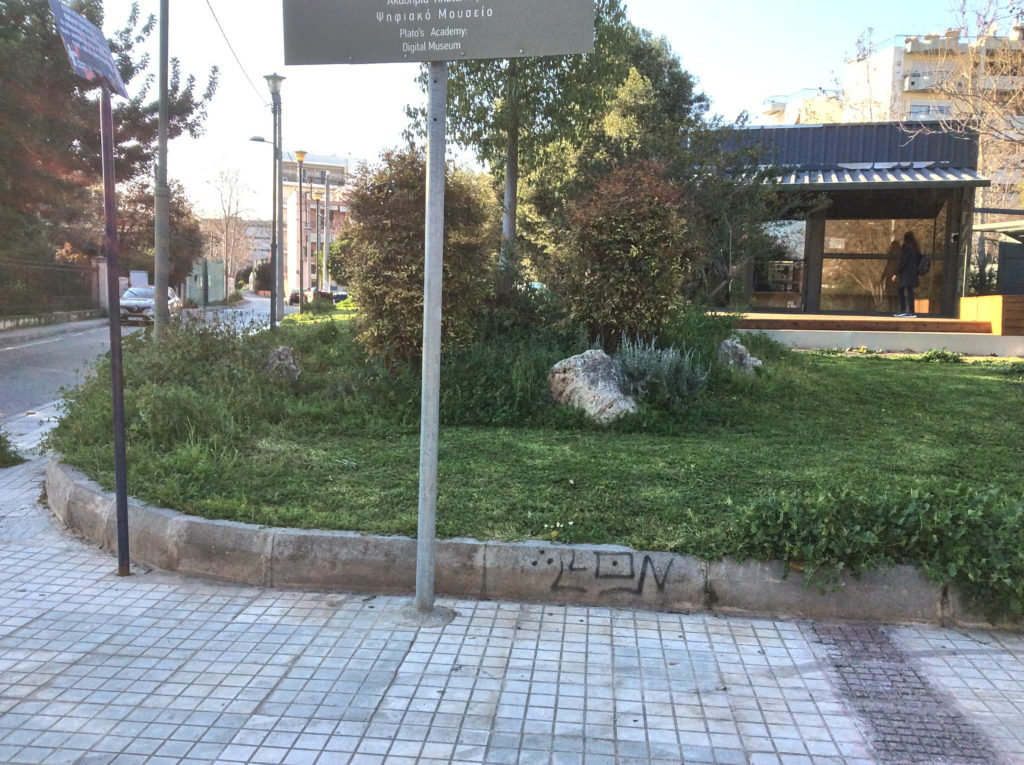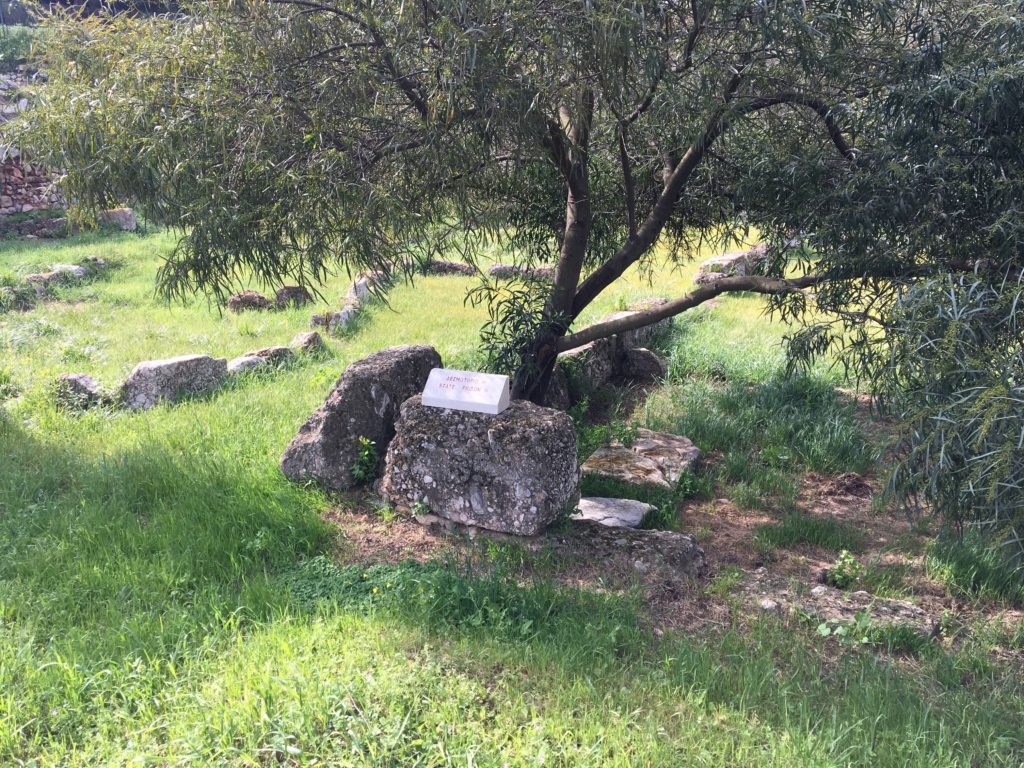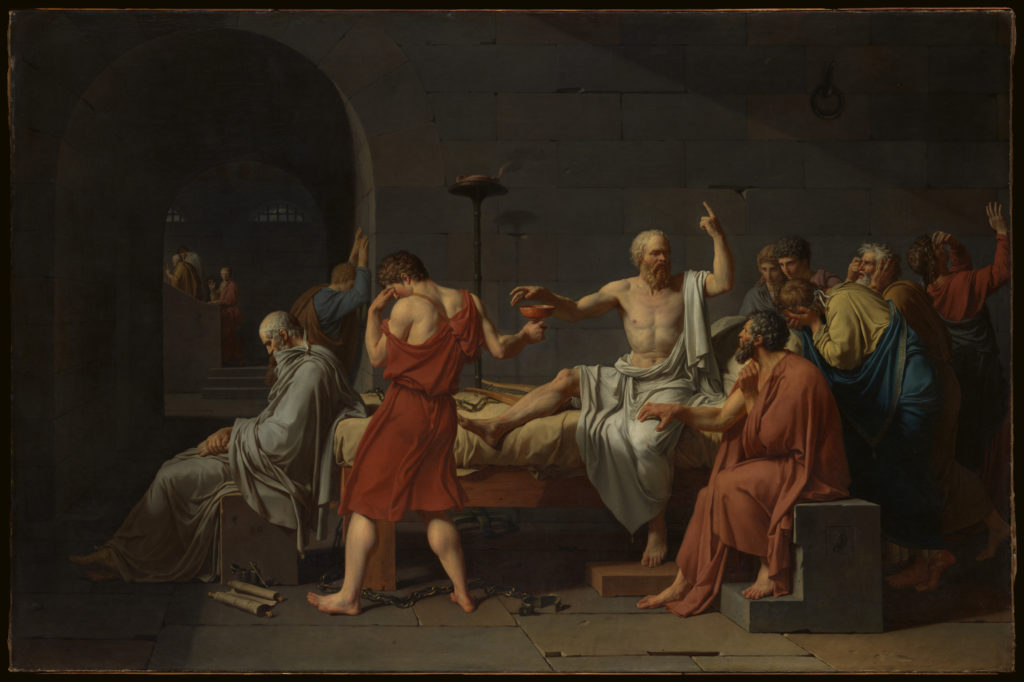The Apology is one of the so-called Early Dialogues of Plato.[1] In it, Socrates makes his own defense of the accusations he had received for corrupting the youths and introducing new gods in the city of Athens.
To start with, it is interesting to note that this dialogue does not take a proper noun (the name of one of the characters in the dialogue concerned) as a title but chooses a common noun, one that refers to the act of defense.
Why is this important?
Because in Greek Ἀπολογία = “apology” does not mean as in current English, “I am sorry,” but refers to a “verbal” defense. It is something you do with words.
So, the dialogue, from the beginning and from its title, purports to give us the “speeches” Socrates himself gave in his own defense at his trial. It is dealing, therefore, with the problem of rhetoric, that is, with the question of “words …”
This is the central point here (and in much of Plato´s philosophy), for if you are searching for what it IS, the “status” of the relation between what it is or what is Real and the word that names it is key.[2]
And why is this so important at the time of the enlightened and brilliant Athens where Socrates and Plato lived in the 5th and 4th centuries BCE?

The answer leads us to the newcomers in the agorā and their use of logos and ideals, that is the rise of the Sophists who taught the youths new tools and had a different perspective of what education [paideia] was. Sophists thought words had nothing to do with the Real or with what it is, but “act” upon the real. And certainly, this could be used as a means of power and success.[3]
The Sophists, then, were teaching the youths mainly how to speak. They were paid masters of rhetoric. Knowing how to speak was becoming the perfect tool to succeed in all domains of society where you were expected to use the “word” to persuade vast audiences and not to say what is Real and True as the philosophers were seeking.
So, there were two kinds of “words” competing in the agōn of Athens´ marketplace by that time: the word of the “sophists” and that of “philosophy,” with actual implications on the conception of reality, and its possibility to know it and name it, that had, on the other hand, important consequences on all the structure of the new society that was arising, since the attraction of the “word” as taught by the Sophists was showing to be absolutely useful, that is pragmatic, for the basic everyday life, from what you were trying to sell or buy in the market or what you were trying to achieve, but also in political affairs, or at court. And what is most significant revealed the mechanism of social relations of power.
In the Socratic Dialogues, Plato uses with such great mastery the mask of Socrates to criticize the Sophists who taught only how to be clever “speakers” but did not teach the “truth.”
We see Socrates practicing what we call a “negative philosophy,” in the sense that he demolished what were thought to be certainties but did not propose something as a replacement. Starting from the statements of the people´s ethical views and, from there, making them reason as to admit they were wrong, to finally make them acknowledge they had only one certainty, that of knowing that they do not know, he taught the wisdom of “knowing we know nothing.” And for that reason, he was mistrusted and perceived as someone annoying.
In the Dialogues, the discussion progresses dialectically and shows a form of paideia in “action”. The action that Socrates as a character performs is reinforced by the subtlety and finesse of Plato´s aesthetic and well-balanced style as a writer. Thus, Plato is making amazing use of the word too. Since Socrates did not write anything himself, it is Plato himself who, by providing Socrates with a “personality” and a “setting” in his texts, managed to build both a character of Socrates performing philosophy and at the same time introduce the core of his own philosophy.
He showed us a very mordant and ironical Socrates, teaching with his action, as a way of life, wandering about in the city and speaking to people. That is what Plato “represents” in his dialogues making us believe that we are actually in front of the real Socrates: a Socrates inquiring about what things truly are, questioning people “what is x” (not what x means).
His figure of Socrates allowed Plato to progressively propose a “positive philosophy”, mainly from the so-called Middle dialogues and the Later ones, where we can see Plato’s own ideas.

Coming back to our dialogue, the Apology of Socrates, that actually is not really a dialogue but almost a monologue, we see Socrates speaking to his accusers and the Jury. Its opening is an excellent demonstration of Socratic irony, and how vivid and effective this can make the argumentation. All the opening scene is built on the topic of “language”:
Socrates
[17a] How you have felt, O men of Athens, at hearing the speeches of my accusers, I cannot tell; but I know that their persuasive words almost made me forget who I was—such was the effect of them; and yet they have hardly spoken a word of truth [alēthēs]. But many as their falsehoods were, there was one of them which quite amazed me—I mean when they told you to be upon your guard, and not to let yourselves be deceived [17b] by the force of my eloquence. They ought to have been ashamed of saying this, because they were sure to be detected as soon as I opened my lips and displayed my deficiency; they certainly did appear to be most shameless in saying this, unless by the force of eloquence they mean the force of truth [alēthēs]; for then I do indeed admit that I am eloquent. But in how different a way from theirs! Well, as I was saying, they have hardly uttered a word, or not more than a word, of truth [alēthēs]; but you shall hear from me the whole truth [alēthēs]: not, however, delivered after their manner, in a set oration duly ornamented with words and phrases.[4]
The whole passage reproduces the style of sophist argumentation with complicated periods and many participles. We notice the parody of the style and the “ornamented” words of the accusers and the sophists that say nothing true.
That is a sample of what was at stake!
Immediately, we see Socrates presenting himself ironically as a babbling old speaker, as someone who has no skill in speaking, and immediately leading us to visualize him in the Agora in the midst of noises, shouts, and different accents and languages in the crest of the competing atmosphere of a market as if the “word” were also another commodity, such as the money the bankers interchange in their money-lending tables.

This is significant, in addition, if we think that contrary to what we see in this scene, Plato himself chose to retire from active political life and devoted himself to writing and teaching philosophy in the Academy, away from the rumors and noises of the Agora.[5]
No indeed! [17c] but I shall use the words and arguments which occur to me at the moment; for I am certain that this is right, and that at my time of life I ought not to be appearing before you, O men of Athens, in the character of a juvenile orator—let no one expect this of me. And I must beg of you to grant me one favor, which is this—if you hear me using the same words in my defense which I have been in the habit of using, and which most of you may have heard in the agora, and at the tables of the money-changers, or anywhere else, [17d] I would ask you not to be surprised at this, and not to interrupt me. For I am more than seventy years of age, and this is the first time that I have ever appeared in a court of law, and I am quite a stranger to the ways of the place; and therefore I would have you regard me as if I were really a stranger, whom you would excuse if he spoke in his native tongue, [18a] and after the fashion of his country—that I think is not an unfair request. Never mind the manner, which may or may not be good; but think only of the justice [dikē] of my cause, and give heed to that: let the jury decide with their virtue [aretē] and the speaker speak truly [alēthēs].
Those “noises” at the Agora are being heard also in the lawcourt. And in court words do matter!
But the fact that words matter in court (or in any domain) does not necessarily mean that the words can or do name the truth. And that is what is relevant for Socrates (and Plato) and for which they are fighting. So as the dialogue evolves, and with the mastery of Plato’s skillful writing and argumentation, we will see Socrates dismantle the speeches and procedures of the accusations against him by “word” and by “action.”
We said an Athenian trial was becoming a question of “words” in the sense that it needed more “persuasion” than “truth” to win a case. Justice depended then on persuasive speeches.
There were two basic trial speeches phases in an Athenian trial.[6] First, the Prosecution gave a speech, the Defense gave a speech in order to determine if the accused was guilty or innocent. Then, if there was a guilty verdict, the Prosecution gave a second speech where they asked for a punishment, and the Defense also gave a second speech asking for a different punishment. Finally, the Jury decided.

In our case, after the guilty verdict, the prosecutor asked for the death penalty expecting Socrates to ask for exile. But instead, Socrates asked for free lunch for life at the City’s expense, which is mordantly hilarious!
[36b] … And so he proposes death as the penalty. And what shall I propose on my part, O men of Athens? Clearly that which is my due. And what is that which I ought to pay or to endure [paskhein]? What shall be done to the man who has never had the wit to be idle during his whole life; but has been careless of what the many care about—wealth, and family interests, and military offices, and speaking in the assembly, and magistracies, and plots, and parties. [36c] Reflecting that I was really too honest a man to follow in this way and be saved [sōzein], I did not go where I could do no good to you or to myself; but where I could do the greatest good privately to everyone of you, thither I went, and sought to persuade every man among you that he must look to himself, and seek virtue and wisdom before he looks to his private interests, and look to the state before he looks to the interests of the state; and that this should be the order which he observes in all his actions. What shall be done to such a one?
[36d] Doubtless some good thing, O men of Athens, if he has his reward; and the good should be of a kind suitable to him. What would be a reward suitable to a poor man who is your benefactor, who desires leisure that he may instruct you? There can be no more fitting reward than maintenance in the Prytaneion, O men of Athens, a reward which he deserves far more than the citizen who has won the prize at Olympia in the horse or chariot race, whether the chariots were drawn by two horses or by many. [36e] For I am in want, and he has enough; and he only gives you the appearance of happiness [with good daimōn], and I give you the reality. And if I am to estimate the penalty justly [dikaiōs], [37a] I say that maintenance in the Prytaneion is the just return.
That is what I call to perform an active irony and a way to put philosophy into practice!
It is not only a question of convincing with words but a practice of life because what is Socrates dealing with is Truth and Justice. And this petition before his death will prove significant.
Moreover, the irony is greatly intelligent because the free lunch was an honor given to champion athletes and prominent citizens. Thus, Socrates by making this petition was actually asking to be honored in a traditional Athenian way! So, he was actually reinforcing the old values in relation with Justice and Truth, in opposition to the new ones, and at the same time, showing with his action what was to be a philosopher, a lover of wisdom from which he was ready to die for.

Hence, Socrates showed that he was sincerely, seriously, piously concerned about the souls of his fellow citizens. He was stinging them like a gadfly but for their own good, because he thought men could be perfectible and aspire to moral virtue. That is why they should give him free lunch! And by the way, here is the moment when Plato managed to introduce his own ideas in the voice of Socrates since this gives him the opportunity to speak of his own conception of death and the immortality of the soul as he will do in book 10 of the Republic with the myth of Er, in the Gorgias and in the Phaedo. But let’s see how he closes the Apology in Socrates’ final speech:
[39e] Friends, who would have acquitted me, I would like also to talk with you about this thing which has happened, while the magistrates are busy, and before I go to the place at which I must die. Stay then awhile, for we may as well talk [diamuthologeîn = speak through mūthos] with one another while there is time. [40a] You are my friends, and I should like to show you the meaning of this event which has happened to me. O my judges—for you I may truly call judges—I should like to tell you of a wonderful circumstance. In the past, the oracular [mantikē] art of the superhuman thing [to daimonion] within me was in the habit of opposing me, each and every time, even about minor things, if I was going to do anything not correctly [orthōs]. But now that these things, as you can see, have happened to me—things that anyone would consider, by general consensus, to be the worst possible things to happen to someone— |40b the signal [to sēmeion] of the god [theos] has not opposed me, either as I was leaving my house and going out in the morning, or when I was coming up to this place of judgment, or as I was speaking. No, it has not opposed me about anything I was going to say, though on other occasions when I was speaking, it [= the signal] has often stopped me, even when I was in the middle of saying something. But now in nothing I either said or did concerning this matter has it opposed me. So, what do I take to be the explanation of this? I will tell you. Perhaps this is a proof that what has happened to me is something good [agathon], |40c and it cannot be that we are thinking straight [orthōs] if we think that death is something bad [kakon]. This is a great proof to me of what I am saying, since the signal [to sēmeion] that I am used to would surely have opposed me if I had been heading toward something not good [agathon].
Let us think about it this way: there is plenty of reason to hope that death is something good [agathon]. I say this because death is one of two things: either it is a state of nothingness and utter unconsciousness for the person who has died, or, according to the sayings [legomena], there is some kind of a change [meta-bolē] that happens—a relocation [met-oikēsis] for the soul [psūkhē] from this place [topos] to another place [topos]. Now if you suppose that there is no consciousness, |40d but a sleep like the sleep of someone who sees nothing even in a dream, death will be a wondrous gain [kerdos]. For if a person were to select the night in which he slept without seeing anything even in a dream, and if he were to compare with this the other days and nights of his life, and then were to tell us how many days and nights he had passed in the course of his life in a better and more pleasant way than this one, I think that any person—I will not say a private individual [idiōtēs], but even the great king— |40e will not find many such days or nights, when compared with the others. Now if death is like this, I say that to die is a gain [kerdos]; for the sum total of time is then only a single night. But if death is the journey [apo-dēmiā] to another place [topos], and, if the sayings [legomena] are true [alēthē], that all the dead are over there [ekeî], then what good [agathon], O jurors, [dikastai], can be greater than this?
In this way, the trial became a philosophic exercise, a paideia, in which in fact what Socrates did was not primarily “defending” himself against false accusations but actually showing “in action” (as in a kind of philosophic stand up) what was he really doing every day: going around the City trying and failing to prove that the Oracle that stated he was the wisest man of all was wrong, as he could not find anyone wiser than him for nobody knew anything but he at least knew he did not know.[7]
So maybe his “guilt” was to expose everyone, and especially the sophists and his accusers, as ignorant idiots…
[42a] …But let me interrupt. You see, the hour [hōrā] of departure has already arrived. So, now, we all go our ways—I to die, and you to live. And the question is, which one of us on either side is going toward something that is better? It is not clear, except to the god.
Notes
[1] Dating the Dialogues has been controversial and ideas have changed over time. I was guided by Kahn, C.H. 1997. Plato and the Socratic Dialogue; and Horn, Müller, Söder. 2017. Platon-Handbuch: Leben – Werk – Wirkung. K. II “Zu Platons Werken” (Chapter II. On Plato’s Works). Traditionally Plato’s works have been divided in three groups, of which those in the “Early” group “represent Plato’s reception of the legacy of the historical Socrates” (Encyclopedia Britannica, “Plato: Early dialogues”.)
[2] These ideas are developed in other Dialogues as the “Theory of Forms.” Further details of the theory: Kahn, 1997. Plato and the Socratic Dialogue; Friedländer, P. Plato. An Introduction. 1969. Princeton.; Guthrie, W.K.C. 1969. A History of Greek Philosophy. Cambridge University Press., especially Volumes 3, 4, 5; or see, for example, Encyclopedia Britannica “Plato: The theory of forms”. For the problem of language, Plato Cratylus; and Kahn, C.H. “Language and ontology in the Cratylus,” in Vlastos, Lee, Mourelatos, Rorty (eds). 1973. Phronesis. Assen, van Gorcum. pp 152–176.
[3] It should be noted that some of the evidence for the Sophists’ beliefs is based on Plato’s criticism of them. For further details on the Sophists: Guthrie, W.K.C. 1969. A History of Greek Philosophy Volume 3, Part 1 The Sophists; Jaeger, W. 1986. Paideia: The Ideals of Greek Culture Volume III The Conflict of Cultural Ideals in the Age of Plato. Oxford University Press; Dupreél, E. 1949. Les sophistes. Neuchâtel; Untersteiner, M. 1949. I Sofisti. Milan; or see, for example, Encyclopedia Britannica “Sophist philosophy: Particular doctrines”.
[4] The Apology of Socrates, By Plato. Translated by Benjamin Jowett. Adapted by Miriam Carlisle, Thomas E. Jenkins, Gregory Nagy, and Soo-Young Kim. Online at the Center for Hellenic Studies
[5] Guthrie, W.K.C. 1969. A History of Greek Philosophy, especially Volumes 4 and 5; or see, for example, Encyclopedia Britannica “Plato: Life.”
[6] Biondi, Carrie-Ann, Miller, Fred D. Jr. 2007. A Treatise of Legal Philosophy and General Jurisprudence Volume 6. For an overview of legal proceedings, please also see “Law and Courts in Ancient Athens: A Brief Overview” here at Kosmos Society.
[7] Plato Apology of Socrates 21a–22e
Bibliography and further reading
Biondi, Carrie-Ann; Miller, Fred. D. Jr. 2007. A Treatise of Legal Philosophy and General Jurisprudence: Volume 6.
Colli, G. 1996. La nascita della filosofia. Adelphi, Milan.
Dupreél, E. 1949. Les sophistes. Neuchâtel: Editions Du Griffon.
Friedländer, P. 1969. Plato. An Introduction. Princeton. Princeton University Press. (English translation of the German Platon: Seinswahrheit und Lebenswirlichkeit. 1964. Berlin. W. de Gruyter & Co.)
Guthrie, W.K.C. 1969. A History of Greek Philosophy. Cambridge, Cambridge University Press.
Volume 3, The Fifth-Century Enlightenment, Part I: The Sophists; Part II: Socrates
Volume 4, Plato: The Man and His Dialogues: Earlier Period
Volume 5, The Later Plato and the Academy
Horn, Christoph; Müller, Jörn; Söder, Joachim (Editors). 2017. Platon-Handbuch: Leben – Werk – Wirkung (Plato Handbook: Life, Work, Effects). J.B. Metzler, Stuttgart-Weimar.
Jaeger, W. 1986. Paideia: The Ideals Of Greek Culture: Volume III: The Conflict Of Cultural Ideals In The Age Of Plato. Translated by Gilbert Highet. Oxford University Press, USA, NYC
Kahn, C.H. 1973. “’Language and ontology in the Cratylus.” In Gregory Vlastos, Edward N. Lee, Alexander P. D. Mourelatos & Richard Rorty (eds.), Phronesis. Assen, van Gorcum. pp. 152–176
Kahn, C.H. 1997 (print), 2009 (online). Plato and the Socratic Dialogue: The Philosophical Use of a Literary Form. Cambridge University Press. https://doi.org/10.1017/CBO9780511585579
Plato. Apology of Socrates. Translated by Benjamin Jowett. Adapted by Miriam Carlisle, Thomas E. Jenkins, Gregory Nagy, and Soo-Young Kim. Available online at the Center for Hellenic Studies
Plato. Cratylus. For example, available online at Perseus. Plato in Twelve Volumes, Vol. 12 translated by Harold N. Fowler. 1921. Cambridge, MA, Harvard University Press; London, William Heinemann Ltd.
Untersteiner, M. 1949. I Sofisti. Lampugnani Nigri, Milano.
Vernant, J.P. 1984. The Origins of Greek Thought. Cornell University Press.
Vernant, J.P. 2006. Myth and Thought among the Greeks. Zone Books. Translated by Janet Lloyd and Jeff Fort.
Image credits
Athenian Agora. Photo: Kosmos Society.
Plato´s Academy small digital Museum. Photo by Όλγα Ψυγογυιού. With permission.
María Eugenia walking in the Akademia archeological site in HAA Spring travel 2019 where I went with a fellow traveler, Olga, in the free time. Photo by Όλγα Ψυγογυιού With permission.
Foundations of the Athenian State Prison where Socrates died. Photo by Hunt Lambert. HAA Spring Travel 2019. With permission.
Jacques-Louis David, The Death of Socrates, 1787. Metropolitan Museum of Art. Public Domain
__
María Eugenia Romero is a member of Kosmos Society, and an admirer of Plato’s discursive strategy that prepares his audience to listen to or read what he himself wants to say!